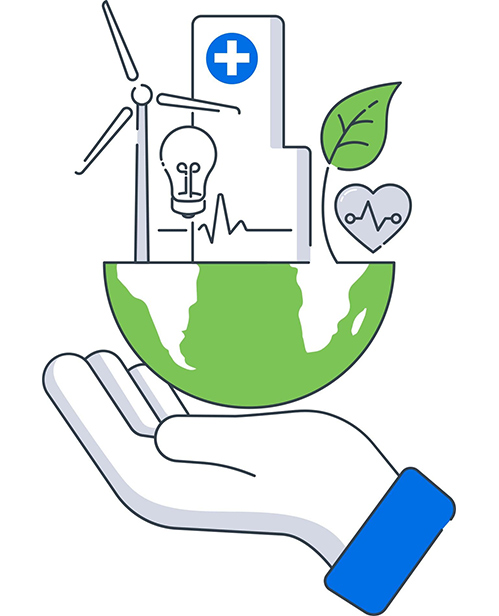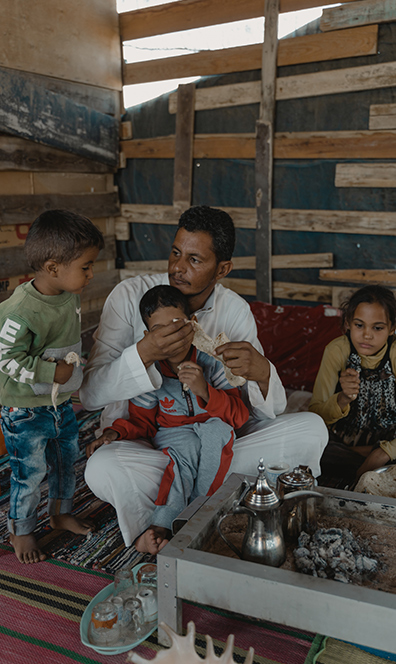- (+2) 01118373999
- hello@ribbonhealth.life
Innovation, Sustainability and The Future of Healthcare

Digital: The Future of Sustainable Healthcare
The desire for bold solutions to transform our healthcare systems and the mindsets of its stakeholders has never been greater. Changing demographic trends, urgent public needs and resource constraints have made it even more essential that decisions to create more sustainable health systems are taken with conviction.
Digital health solutions and health information technology are systematically transforming the way health care is delivered in the 21st century. Telemedicine and digital diagnostics solutions enable patients to receive remote and fast diagnostics in a more convenient way, electronic health records enable users to manage their health data and innovative smartphone applications provide patients with effective treatment, prevention or disease management solutions for conditions ranging from diabetes to depression.
By leveraging digital technologies, healthcare providers can reach underserved populations, enhance patient outcomes, and diminish healthcare disparities—all while minimizing their carbon footprint.
Pursuing Sustainability for Healthcare through Digital Platforms
Ribbon’s overarching goal is to meet the Sustainable Development Goals (SDGs) and, in particular, universal health coverage (UHC) by investing in digital health. Health care systems in both developed and developing nations have begun to embrace the transformative power of information and communication technology, from electronic health records that integrate and organize medical data and enable providers to share it easily, to mobile technology that spurs better informed decisions by people and health workers in rural areas and hospitals.
Ribbon is committed to making sure environmental and social sustainability is core to the design of our new healthcare technology. Without it, there’s a real risk of negative impacts affecting the energy and material footprint of the healthcare system.


Ensure healthy lives and promote well-being for all at all ages.

Digital health apps are becoming increasingly popular, and often show very high engagement from their users. Due to the easy accessibility as smartphone apps, comparative affordability and ability to convey health information in a digestible format, these apps have the potential to empower patients with low incomes and in developing economies, where health services are underdeveloped and healthcare is not affordable to everyone.

Millions of people in developing countries struggle to access basic health care, and the WHO estimates that by 2030, almost 13 million additional skilled health professionals are needed worldwide. In developing countries, the shortage of skilled doctors and the lack of medical knowledge is particularly pronounced. AI hold the promise to transform health-care in resource poor settings, address the skills and knowledge gap and and thereby to reduce the inequality of health care systems between countries. Expert systems, e.g. symptom checkers can provide expert level competence to patients and medical staff in developing countries, thereby contributing to the democratisation of medical knowledge and information. AI based solutions are particularly powerful if combined with Electronic Health Records (EHRs). EHRs hold the additional advantage that they can enable the implementation of applications relying on IT infrastructure in countries where such infrastructure does not yet exist. And when combined with natural language processing (NLP) capability, AI can be used to mine the EHR and the medical literature to provide expert treatment advice where no experts are present. This way, DHS offer the potential to “leap frog” health service technology in developing economies.

We honor the trust our members place in us to safeguard their health data. We are committed to acting transparently and with integrity in using our members’ data to deliver insights to our community.

Electronic health records (EHRs) enable patients to not only store digital versions of their health records, but also to request them from and exchange them with health care providers. Digital copies of patients health records could therefore substitute the use of paper, and make the use of paper based health records obsolete. Telemedicine solutions and symptom checkers have the potential to reduce the need for ambulatory visits, and if visits take place, a patient equipped with a complete electronic health record will enjoy more productive visits, with better outcomes being able to be achieved with fewer visits, and less unnecessary double treatments. Telemedicine and EHR can result in a reduction of in-person visits by up to 26%, and the rate of ambulatory care visits by 7-11%. Replacing physical visits by telemedicine can result in a 40-70% reduction of carbon emissions. The savings potential due to reduced trips for Kaiser Permanente is estimated to be equivalent to up to the carbon sequestered by up to 19.200 acres of fir or pine forest.
Ready to share a positive Social Impact ?
Making a Positive Social Impact

We treat people right, get it right and do the right thing through partnerships that address human health and social justice.
Ribbon Health is a for-profit digital health social venture that’s explicitly dedicated to the social purpose of developing a cancer-care ecosystem in low- and middleincome countries while making a profit.
We use new technologies to democratizing access to cancer care. Yet, technology in and of itself is not a solution. The economic value of a technology remains latent until it is commercialized in some way. While the clinical effectiveness of applications, such as telemedicine, is generally acknowledged, there remains considerable controversy about how to assess the costs and benefits. Without a self-sustaining business model, such innovations risk becoming part of the problem rather than part of the solution.
We collaborate with our partners—from clients and nonprofits to our local communities and with one another—to address the environmental and social drivers of global inequities. We align our social impact efforts with our environmental, social and governance (ESG) priorities and the U.N. Sustainable Development Goals of global health and well-being, reduced inequalities and climate action.
Across our partnerships, we strive to understand and address the social, physical and environmental conditions that drive approximately 80% of health outcomes. These include: access to quality healthcare, food security, education, economic stability, physical environment and behaviour lifestyle.
